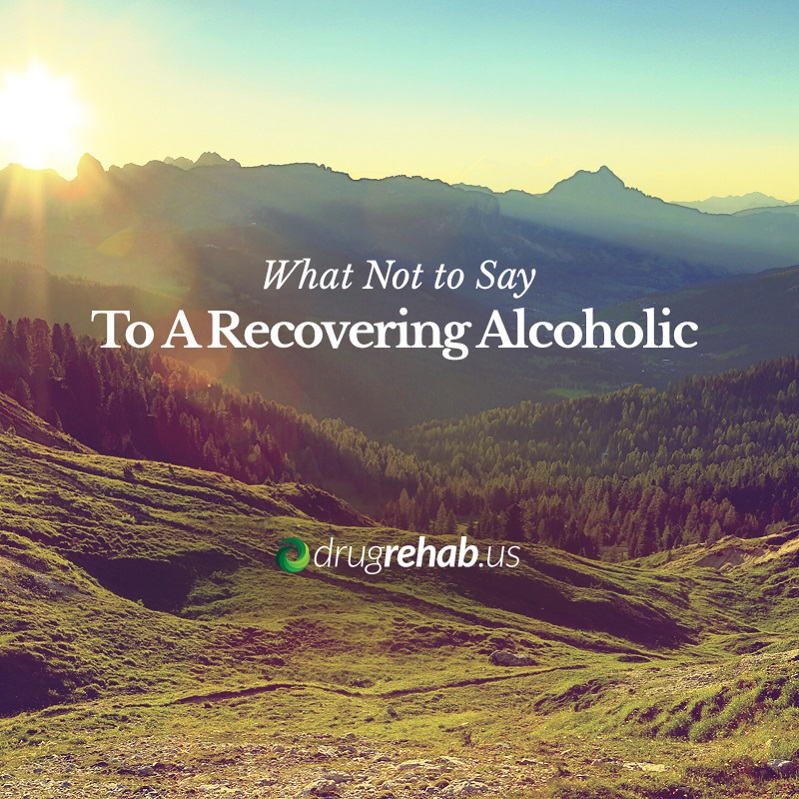15 Jun 2015
Summer Drinking Dangers
Summer is a time when many of us want to celebrate. Winter is over with. With more daylight hours of bright sun, the beach beckons. There are graduation parties, Fourth of July barbecues, and any-reason-at-all parties to attend. It’s a great time to get together with friends, enjoy the long days and have a good time. Unfortunately, a lot of these celebrations involve alcohol and all the dangers associated with it. Stay safe this summer and consider partying alcohol-free. If you are going to indulge, do so responsibly and safely.
Drinking Dangers During The Summer
Alcohol And The Heat
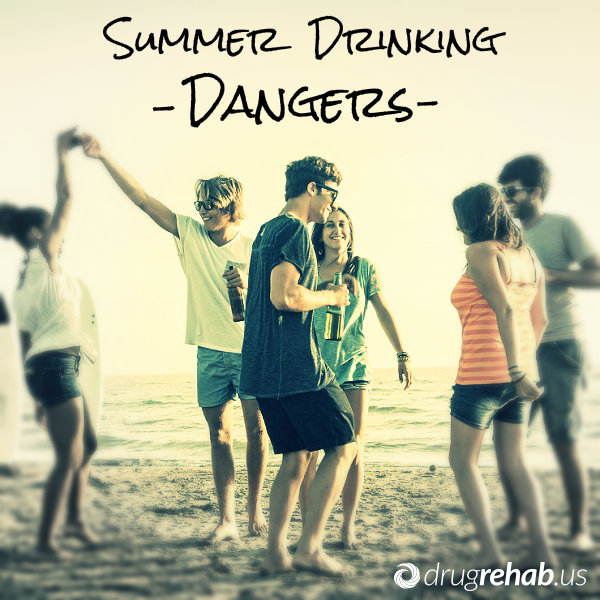 Many of the best summer parties are outdoor barbecues and picnics. It’s natural to want to drink at these events. You’re warm and relaxed and enjoying the company of your friends or family. Being outside while temperatures are high and the sun is shining can be a health hazard even without alcohol.Without proper precautions you may suffer from heat stroke, sunburn or dehydration. Alcohol can worsen these conditions and speed their onset.
Many of the best summer parties are outdoor barbecues and picnics. It’s natural to want to drink at these events. You’re warm and relaxed and enjoying the company of your friends or family. Being outside while temperatures are high and the sun is shining can be a health hazard even without alcohol.Without proper precautions you may suffer from heat stroke, sunburn or dehydration. Alcohol can worsen these conditions and speed their onset.
If you are planning to drink outside, do so in moderation and don’t forget to drink plenty of water as well. Use sunscreen and spend time in the shade to avoid too much sun exposure, avoid caffeinated drinks and stay cool with ice water.
Alcohol And The Water
What would a summer party be without a pool, lake or ocean-side beach? If you’re drinking near or on the water, the risk of harm is great. In fact, one out of every two deaths that occurs during water recreation is related to alcohol. While many people take drinking and driving very seriously, not everyone considers drinking and boating to be an issue. An intoxicated boat operator can cause terrible damage from accidents. Passengers drinking on boats may lose balance and fall overboard.
There are also the same hazards that involve drinking and being exposed to heat and the sun. On a boat it may not be possible to get drinkable water to stay hydrated, or to find relief from heat and sun. If you’ll be out on a boat, it’s best to refrain from drinking at all. If there will be drinking, bring along plenty of water, sunscreen and light clothing. Never let the operator of a boat drink.
Parties And Binge Drinking
Most people have lots of parties to attend over the summer, which gives ample opportunities to drink too much. When you’re having fun at a party it can be easy to forget how much you have had. Women should not have more than four drinks at once, or men more than five. Drinking more is considered binge drinking and is particularly dangerous. Binging can lead to car accidents, assaults and fights, unplanned pregnancies, increased blood pressure, heart disease and other serious problems.
Binge drinking can turn a fun party into a nightmare. Always keep track of what you are drinking at parties and set a limit. Drink one non-alcoholic beverage in between every alcoholic drink to keep yourself from getting out of control. It also helps to have a friend or partner monitor your intake and warn you if you are close to drinking too much.
Summer is a season full of sun and fun, and plenty of parties. Make the most of your summer vacation without an alcohol-related tragedy. Be careful, be aware of how much you and others drink and stay hydrated so that you can expect to enjoy your summer safely.
Read Our Other Posts With Helpful Tips & Tricks
01 Jan 2015
Am I Abusing Alcohol?
If you’ve ever thought about how much you drink, if your habits are healthy or if you abuse alcohol, you’re ahead of most people. Many people abuse alcohol but avoid thinking critically about their actions or what it means.
Do You Have A Problem With Abusing Alcohol?
It’s easier to ignore potential problems with drinking, but it can also be confusing to understand what constitutes normal drinking, alcohol abuse and alcoholism. While alcohol abuse doesn’t necessarily lead to alcoholism, it can put you on that path. Learn more about what this means and find out if you abuse alcohol.
What Is Moderate Drinking?
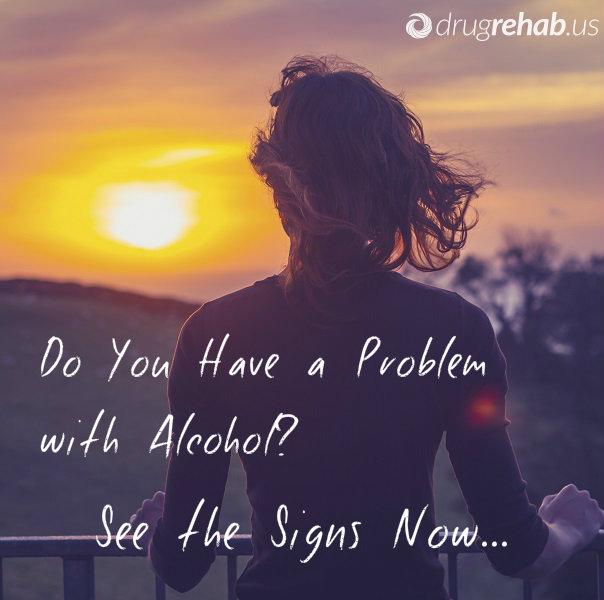 There’s no hard and fast rule for what constitutes alcohol abuse, but there are guidelines for what’s considered to be moderate drinking. Some experts would say that anything over moderate drinking is abuse, while others would argue that this viewpoint is too extreme.
There’s no hard and fast rule for what constitutes alcohol abuse, but there are guidelines for what’s considered to be moderate drinking. Some experts would say that anything over moderate drinking is abuse, while others would argue that this viewpoint is too extreme.
According to guidelines set by the U.S. Department of Agriculture and the Department of and Human Services, moderate drinking for a woman is up to one drink per day and for a man up to two drinks per day.
What Are The Signs Of Alcohol Abuse?
Everyone is different and responds in varied ways to alcohol. Some people can drink more and be less affected. What’s more important than the guidelines for moderate drinking are the behaviors, consequences and motivations regarding your drinking. Look critically at your drinking habits for these signs of alcohol abuse:
- Your drinking causes you to neglect responsibilities – This could mean that you forget to pick up the kids from school or that you can’t drive them to activities because you are under the influence. Maybe you neglect to spend time with an elderly parent because you would rather be drinking.
- You drink to relax or to cope with negative emotions – Using alcohol to feel better is called self-medication and is a sign of abuse. The occasional drink after work to unwind is not usually a problem, but can be when it becomes a habit.
- You drink even when it could be dangerous to do so – For example, when you are about to get behind the wheel of your car or operate another type of machinery.
- You drink in spite of the problems it causes in your relationships – If your partner urges you to drink less and you don’t, or if you fight about your drinking patterns often, you are letting alcohol deteriorate your relationship.
- Your drinking causes legal problems – Such as a DUI or an arrest for behavior caused by being drunk.
What Is Alcoholism?
If you can identify any of the above signs in your behaviors when it comes to drinking, you’re abusing alcohol. It’s important not to confuse this with alcoholism.
Alcoholism means being physically dependent on alcohol. Alcoholics drink a lot every day. They can’t control how much they drink, even if they want to cut down. They feel physically sick if they can’t drink. There are big and important differences between abusing alcohol and being an alcoholic.
How To Change Your Drinking Patterns
Abusing alcohol doesn’t always lead to alcoholism. Most people who abuse alcohol can change their behaviors before it gets to that point. You have the ability to make changes now, for the better.
Enlist the support of a friend or partner and tell this person that you want to cut back. Come up with better ways to cope with stress, such as exercise or meditation. Set goals that are attainable and work toward them.
If you try these strategies and still find it hard to change your patterns, consider working with a therapist or counselor. With a little guidance you can learn to have a healthy relationship with alcohol.
If You Or Someone You Love Is Abusing Alcohol – Don’t Hesitate –
Call Us Now To Begin A Life Of Healing And Freedom!
11 Nov 2014
5 Facts About Veterans And Substance Abuse
Veterans Day is a time to remember and celebrate the people who have made sacrifices to serve in the military. If you have a veteran in your life, you know the toll that service can take. Mental health issues, including substance abuse, are common among men and women who have seen combat overseas. We should all recognize this struggle and be more aware of the issue. With awareness comes understanding, compassion and real change.
Facts About Veterans And Substance Abuse
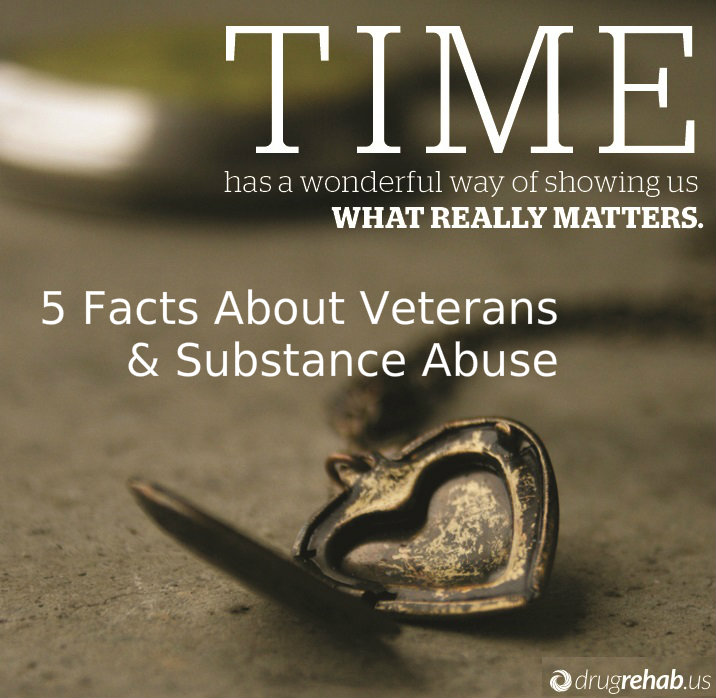 1. Prescription Abuse Among Vets On The Rise
1. Prescription Abuse Among Vets On The Rise
Use of illicit drugs by active military personnel is quite low. Compared to civilians, men and women in the military rarely use illegal drugs because of strict policies and enforcement by random drug testing.
On the other hand, prescription drug abuse is a real problem for both active duty military personnel and veterans. The rate of misuse of prescriptions increased from 2 percent in 2002 to 4 percent in 2005 and 11 percent in 2008.
2. Veterans Have A Drinking Problem
Alcohol may be legal, but it is a substance of abuse for many people and veterans are no exception. The Armed Forces Health Surveillance Center says that one in eight troops get streatment for alcohol abuse after returning from overseas deployment. While women are not immune from the problem of drinking, men are the ones who are really struggling. Twenty three percent of male veterans binge drink, compared to 14 percent of female veterans.
3. Substance Abuse And Veteran Suicides
For most of modern military history, suicide rates have been lower for troops and veterans than for civilians. Starting in 2004, though, the incidents of suicide in the military have been rising. In 2008, the rate of suicides in the military surpassed the rate among civilians. Substance abuse is often involved in cases of suicides. According to the Army Suicide Prevention Task Force, one-third of suicides included abuse of prescription drugs.
4. PTSD Is Linked to Substance Abuse
Post-traumatic stress disorder, or PTSD, is a common mental health issue for veterans. The experiences of combat haunt military personnel — some develop the flashbacks, panic attacks, nightmares and other symptoms that characterize PTSD. Many turn to drugs or alcohol as a form of self-medication. Nearly a quarter of veterans with PTSD will also develop a substance abuse problem, and one-third of those seeking treatment for substance abuse also have PTSD.
5. Treatment Is Available For Vets
If you are a veteran and you struggle with drug or alcohol use, or you care about a vet who is having a problem, know that help is available. The Department of Veterans Affairs offers several services for vets, including screening and diagnosis. This first step can even be done anonymously. The veteran can then decide to take steps to get treatment. Options for treatment are varied and include therapy, couples and family counseling, support groups, care for a dual diagnosis of mental illness and substance abuse, and medication. The VA offers residential treatment as well as outpatient care and continuing care.
Substance abuse is a common problem among veterans because of the experiences of active duty. Mental health care is crucial to these important people and they deserve to have the best treatment modern medicine can offer.
If you or someone you care about is struggling with drinking, drugs or mental illnesses like PTSD, contact the VA and find out how to get access to treatment. It could save the life of the vet you love.
When you are guiding a loved one through the process of getting help for alcohol abuse, it can be easy to feel overwhelmed. You want the best for the person you care about, but there are so many choices. How do you know which facility and which type of program is right and will be most effective? The first step is to understand what the options are. Then you can make an informed and personal decision about seeking care.
Alcohol Treatment Options – How To Choose The Right Alcohol Treatment Program
When it comes to care for alcoholism and alcohol abuse, there is no one-size-fits-all option. Addiction care is personal and most effective when it is individualized to meet the particular needs of each patient.
Your loved one needs the type of care that will work best for him. These are some of the options:
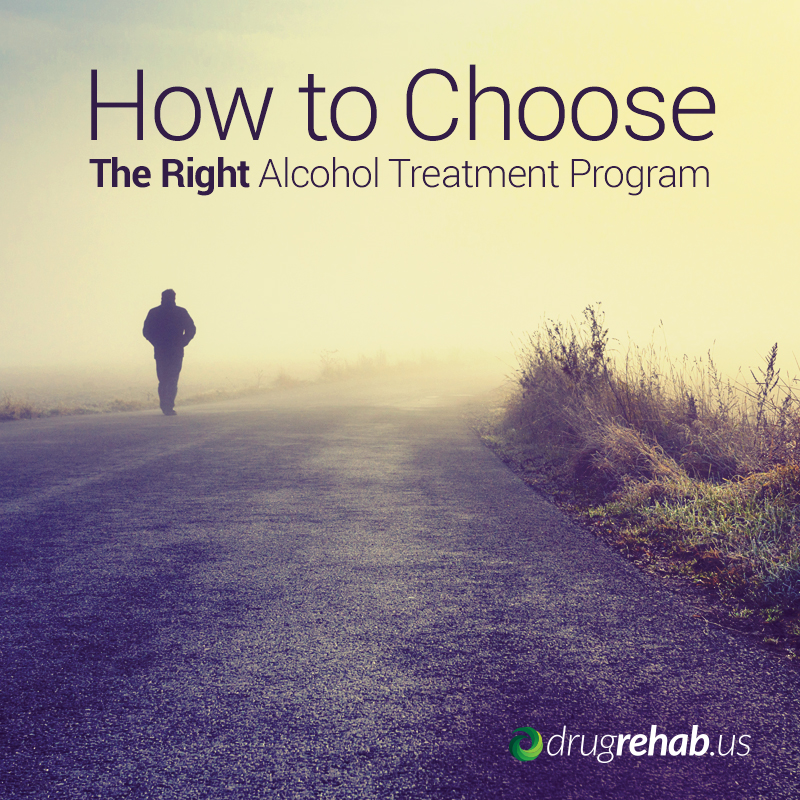 Outpatient counseling – Counseling is useful for anyone who abuses alcohol. On an outpatient basis, it allows the patient to stay at home and to continue going to work or school. This may not be the best option for someone who is a serious alcoholic. Counseling may include group therapy, family therapy or one-on-one counseling.
Outpatient counseling – Counseling is useful for anyone who abuses alcohol. On an outpatient basis, it allows the patient to stay at home and to continue going to work or school. This may not be the best option for someone who is a serious alcoholic. Counseling may include group therapy, family therapy or one-on-one counseling.
- Intensive outpatient program – An intensive program can allow the patient to stay at home, but still receive intense care. This requires a big time commitment, but is good for someone who needs extra support and feels most comfortable staying at home with family.
- Inpatient or residential care – Residential care means staying in a facility for a month or more. This allows the patient to receive intensive, daily care and 24-hour monitoring.
- Sober living – A sober living facility is similar to residential treatment, and may include intensive therapy and treatment. It is often used as a facility for someone who has completed residential care, but is worried about going home. It involves living in a house with other alcoholics in recovery and there are strong social and support components.
- Support group – A support group is a meeting of people trying to cut back on drinking or stay sober after going through treatment. Many are anonymous and follow a 12-step philosophy. These groups can be used as a stand-alone treatment or as ongoing treatment for alcoholics already in recovery.
Making The Right Treatment Choice
Now that you know more about the options for alcohol addiction and abuse treatment programs you can help your loved one make a good decision. Think about his needs and his personality and which type of program would suit him best. If he has a strong support system at home, maybe outpatient care would be best. If he can’t be trusted to not keep drinking, a residential facility might help. If he is not yet an alcoholic, but is engaging in dangerous drinking habits, individual therapy or attendance at a support group may be enough to help him make some important life changes.
As you pick out a facility together, make sure you keep a couple of other factors in mind. Look for a program that has good credentials and a well-trained and experienced staff. You should be able to get positive references from any reputable program. Also look for a facility or therapist that will tailor a program to meet the individual needs of your loved one. A rigid plan used for everyone is not going to be effective. If you keep these things in mind and are careful in your selection process, you should be able to find a treatment program that will help your loved one get sober and learn to stay alcohol-free.
Christian Or Secular Drug Rehab – Which Is Right For You? – Let Us Help You Make This Important Decision
06 Nov 2014
What Not To Say To A Recovering Alcoholic
One of the most important factors for a recovering alcoholic in staying sober is the support of friends and family. Developing a strong support network of caring people is crucial to helping a recovering alcoholic. Even when she feels strong in recovery, know that there will be moments of weakness. These are the times when she should be able to lean on you and other supportive friends. With that in mind, understand how important your role is and be sensitive to your friend’s needs. Think before you speak and avoid saying something that will hurt her feelings or her recovery.
Be Careful To Not Say These Things To A Recovering Alcoholic
You’re Not Really An Alcoholic
Nothing could be more insensitive than belittling your friend’s struggles. Whether or not your friend describes herself an alcoholic is not up to you to decide. Even if you were along for the ride, you have no idea what her battle is really like. Only she can know that. Also understand that alcoholics in recovery are still alcoholics. The disease of addiction is one that is lifelong. Your friend will always struggle to resist the urge to drink. Don’t downplay that struggle.
I Feel So Bad For You That You Can Never Drink Again
Pity is the last thing a recovering alcoholic needs. She also doesn’t need to be reminded of the fact that she can’t drink anymore, possibly ever. What she does need is your support in being sober. This doesn’t mean you can’t drink anymore. It does mean that you can play up the other great things you can do in life without drinking. Instead of feeling sorry for her, get her to join you for non-drinking activities. Work out together. Hang out in coffee shops. Become volunteers together for a cause that is important to both of you. Help her embrace a sober life and see how great it can be without alcohol.
You Just Need More Willpower
Nothing is more offensive to a recovering addict than a discussion of willpower. If you don’t understand the disease of addiction, read up on it. Being addicted is about much, much more than simple willpower. Addiction is not a failing in your friend; it is a medical condition. She required treatment and support to stop drinking. Willpower alone cannot help any addict. Thinking that it can is an insult to your friend and her struggles.
Let’s Meet At That Bar We Used To Like
Your friend in recovery may be strong and firm in her sobriety, but you should never assume that she is OK with meeting up in a bar. It is especially insensitive to suggest a bar in which she used to drink. Addicts need to avoid triggers in order to resist the urge to relapse. She may be comfortable being around alcohol, or even other people who are drinking, but let her bring up that fact. Never make that assumption for her. She may go along just to prove her strong sobriety, but it could end up being a mistake. Instead, suggest that you hang out at home, at a café or coffee shop, a park or anywhere else but a bar.
Being a friend to a recovering alcoholic is not always easy. Some days it may feel like walking through a minefield. If you are sensitive to your friend and her needs and you think about what you say before it comes out of your mouth, you can be the good, supportive friend that she really needs.
03 Nov 2014
Drinking And Stress: A Dangerous Combination
Do you have a glass of wine to unwind in the evening after work? Do you reach for a cocktail after a stressful situation? Do you start to look forward to your evening drink earlier in the day when you’re feeling stressed? If you can say yes to any of these questions you are probably using alcohol to cope with stress. Drinking can make you feel momentarily looser, calmer and more relaxed, which is why many people use it to unwind. Doing so is a dangerous habit, though. You can make your stress worse by drinking and even risk becoming dependent on it.
Alcohol As Stress Relief
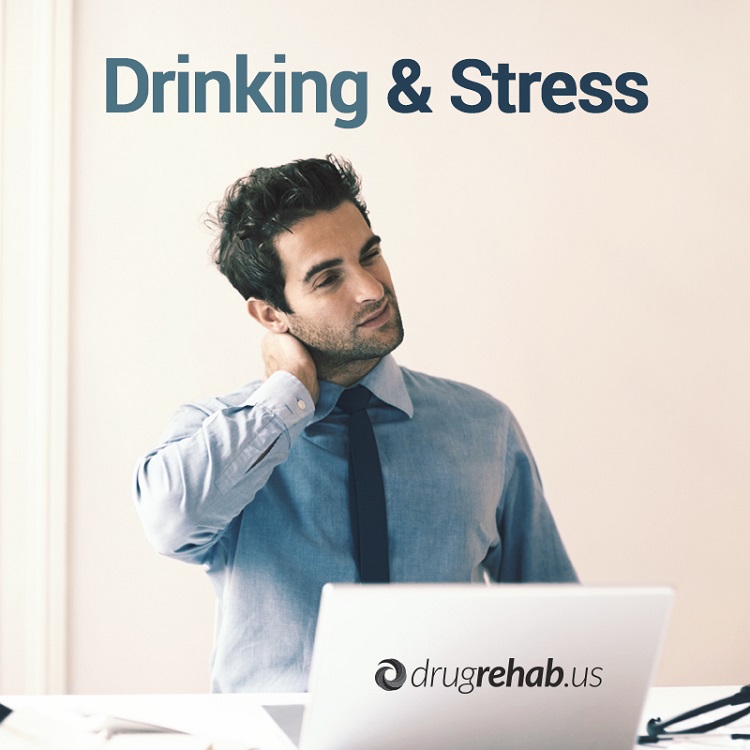 Many people turn to drinking to relax and ease the everyday stresses of modern life. Most of us are busier than ever. We have demanding jobs, and in a rough economy, holding onto those jobs becomes crucial. We often sleep poorly and get too little exercise. Our diets are not always the best. On top of all this you may have other stresses in your life: troubled relationships, financial problems, trauma, a death in the family, etc.
Many people turn to drinking to relax and ease the everyday stresses of modern life. Most of us are busier than ever. We have demanding jobs, and in a rough economy, holding onto those jobs becomes crucial. We often sleep poorly and get too little exercise. Our diets are not always the best. On top of all this you may have other stresses in your life: troubled relationships, financial problems, trauma, a death in the family, etc.
Why wouldn’t you want to drink to feel better? Hanging out with friends at the bar and having a few cocktails or beers are fun activities. It’s no wonder many of us engage in drinking to diffuse stress. In the short term it can make you feel better, especially when you add in the socializing time with friends. In the long term, however, drinking can send your stress levels spiraling upward.
The Stress-Drinking Cycle
Researchers have shown that stress and drinking effect each other and result in a cycle of interaction that leads to worsening stress. One study found that alcohol changes how the body copes with stress. Drinking can actually reduce the stress hormones your body produces in difficult situations, but it also prolongs the tension that you feel associated with stress.
On the flipside, stress changes the way alcohol impacts your mood. When you are stressed and you drink you will crave more alcohol. You will also find that the positive feelings you normally get from alcohol are reduced. This interaction between stress and alcohol that goes on inside your body means that drinking actually worsens your stress. As your stress gets more intense, you may drink more and the cycle continues. Drinking will never cure you of chronic stress.
If you continue to use alcohol as a means of relaxation and stress relief you run the risk of falling into the stress-alcohol cycle. And if you land in that cycle you could end up becoming dependent on alcohol. Alcoholism is a disease and it takes a serious toll on both the mind and the body. Becoming an alcoholic means more stress in addition to physical health problems.
Healthy Stress Relief
One of the ways in which friends can be good for your mental health is when you interact in a social group. Having good social support can make you more resilient in the face of stress. Hanging out with friends and family, talking, laughing and having a good time helps to relieve stress that you already have. If you can keep the social engagements, but take out the alcohol, or at least reduce it significantly, you will have a powerful prescription for managing your stress. Add to your social interactions a healthy diet, plenty of exercise, downtime engaging in fun activities and you have a healthy stress relief plan and no need for that next drink.
Do You Find Yourself Drinking More And More To Relieve Stress? Call Us Now For Help!
22 Oct 2014
Alcoholics And Their Excuses
Alcoholism is a disease. It is chronic and it requires lifelong treatment to stay sober. While going through rehab and staying sober are challenging, the first and biggest step for an alcoholic is to get past the excuses and admit to having a problem with drinking.
 Heavy drinkers deny having a problem for a variety of reasons. They fear what happens in detox. They worry about what people will say. Most of all they fear what life will be like sober.
Heavy drinkers deny having a problem for a variety of reasons. They fear what happens in detox. They worry about what people will say. Most of all they fear what life will be like sober.
In spite of the fears, it is important for alcoholics to get help. The consequences of not doing so may be serious.
Pregnant alcoholics risk fetal alcohol syndrome. All alcoholics face health consequences like liver or heart disease. Accidents are common among alcoholics. They also must face the possibility of losing relationships.
Excuses Of An Alcoholic
If you have a loved one who drinks too much, confront him or her. Be prepared to hear this list of excuses alcoholics give to explain drinking:
- I need to drink to feel comfortable in social situations – Many people face social anxiety. It is a real disorder, in fact. It is not uncommon to self-medicate with drugs or alcohol, but it is not a good excuse. Self-medicating is dangerous. Therapy can help anyone overcome social anxiety.
- I’m only hurting myself – Addicts are great at claiming that their habit is their own business. Remind your loved one that drinking affects everyone else too. When drinking makes the alcoholic remote, angry or temperamental, everyone suffers. When drinking costs the family money, everyone suffers.
- I need alcohol to cope with work stress – This is a common excuse. Stress relief is an important part of being healthy and a drink or two on tough days does not make one an alcoholic. Many jobs are stressful and drinking feels good. This may be why there is so much alcoholism in the healthcare field and other high-stress careers. It isn’t an excuse for heavy drinking, though. There are many other ways to cope with stress.
- This is just who I am – This excuse is an outright lie. Alcoholics weren’t born drinking. They change to become an alcoholic and they can change again to get sober.
- I’m not as bad as other people – Comparing a drinking problem to a worse problem in someone else is a very weak excuse for drinking. Being an alcoholic exists outside of everyone else. When considering a personal problem, like drinking, it makes no difference what everyone else is doing.
Professional And Caring Help Is Needed
The list of excuses that alcoholics make could go on and on forever. They will come up with anything under the sun to justify continuing to drink and to avoid getting help. When the excuses finally run out, you can hopefully convince your loved one to get much-needed help. Only professional therapy and counseling, along with your support, will be enough to overcome all the excuses.
See How To Recognize The Signs Of Addiction Denial In A Loved One
If Your Loved One Needs Help With A Drinking Problem, Reach Out To Us Today – We Will Help You And Your Loved One Take That First Step!
15 Oct 2014
Should I Try Medications For Alcoholism?
There has long been a prevalent philosophy of addiction treatment that includes total abstinence. Of course it makes sense for an alcoholic to abstain totally from drinking, but some also say you should avoid drugs wherever you can, including medications. Ideas are changing, though, thanks to research.
We now know much more about addiction and its effect on the brain than ever before. Researchers have developed medications that may be able to help you recover more effectively and stay sober more easily. Not all agree that drugs are the way to go, so what should you do?
What To Do When Deciding Whether Or Not To Try Medications For Alcoholism:
Read Up On Drugs For Treating Alcoholism
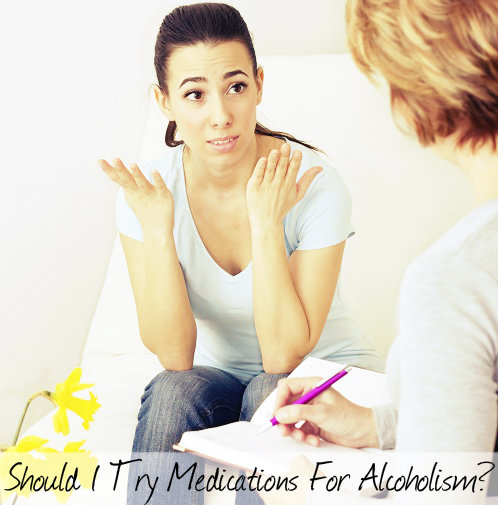 The first and best thing you can do when it comes to making a choice about medications is to read and learn. Knowledge is power, so read up on the drugs available to treat alcoholism and learn more about each one. Armed with the information, you can make a better choice and have a more intelligent discussion with your doctor and therapist.
The first and best thing you can do when it comes to making a choice about medications is to read and learn. Knowledge is power, so read up on the drugs available to treat alcoholism and learn more about each one. Armed with the information, you can make a better choice and have a more intelligent discussion with your doctor and therapist.
3 Common Alcoholism Treatment Drugs
Here is some introductory information to get you started learning about three of the most common drugs:
- Antabuse – The generic name for this drug is disulfram, and it has been around for decades helping alcoholics stop drinking. If you take the medication as directed and try to drink, you will get very sick. Symptoms are short-lived and include nausea, vomiting and headaches.
- Naltrexone – Naltrexone blocks the high, or pleasant feeling, that you normally get when drinking alcohol. If you take it as directed, you will have no reason to drink.
- Acamprosate – This is one of the newer drugs on the market for alcoholics and it works by helping you to resist the urge to relapse. You are only supposed to take this medication after you have given up drinking. It reduces some of the long-term withdrawal symptoms that would make you turn back to drinking.
Discuss Treatment Medications With Your Doctor And Therapist
You should always discuss your treatment plans with those experts you trust to your care. Of course your doctor will be the one to prescribe a medication, or your psychiatrist if you have one. Discuss the pros and cons with both your prescribing doctor and your therapist or drug counselor. These professionals can help you make an informed decision about whether alcoholism medications are right for you.
The most effective addiction treatment plan is one that is tailored to your specific needs. You, along with the professionals who know you and your history, are best qualified to develop a plan, whether or not it includes medications.
Never Rely Solely On Medication To Overcome Your Addiction
If you decide to give one or more of these medications a try, keep in mind that none of them is designed to be used alone. All are approved to treat alcoholism in conjunction with psychosocial therapy. This means that you need to use other treatment methods, including behavioral therapy, psychotherapy and support groups together with drugs for effectiveness. Drugs alone are not the answer because there is no simple cure for alcoholism or any other type of addiction.
The ultimate choice as to whether or not you try drugs to treat your addiction is up to you. In order to make the best choice for yourself and your future, make sure you are educated about the options, discuss with your medical and counseling professionals and make medications just one part of an overall treatment plan. If you follow these steps and make the commitment to stick to your plan, you stand every chance of a successful recovery.
See Other Drug And Alcohol Rehab FAQ’s


